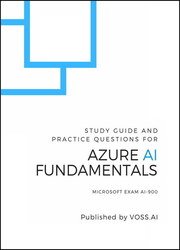Azure AI Fundamentals: Study Guide and Practice Exam for the Microsoft AI-900 Exam
- Добавил: literator
- Дата: 9-08-2020, 17:27
- Комментариев: 0
 Название: Azure AI Fundamentals: Study Guide and Practice Exam for the Microsoft AI-900 Exam
Название: Azure AI Fundamentals: Study Guide and Practice Exam for the Microsoft AI-900 Exam Автор: David Voss
Издательство: VOSS.AI
Серия: Azure AI (Book 1)
Год: 2020
Язык: английский
Формат: pdf, azw3, epub
Размер: 15.0 MB
This study guide follows the syllabus for the Microsoft AI Foundations exam (AI-900). More importantly, this book will help you gain the foundational knowledge needed to become an AI practitioner. You do not need a mathematical or programming background to understand the concepts in this book or to pass the AI-900 exam.
About VOSS.AI
The motto of VOSS.AI is "AI for All." VOSS.AI creates products and services for anyone who has an interest in learning about Artificial Intelligence. We have chosen Microsoft AI as our platform of choice because Microsoft has made a concerted effort to ensure their AI products are accessible to everyone.
Study with Confidence
We are committed to the integrity of the exams, as well as you as a student. This study guide does not contain any material that compromises the integrity of any Microsoft exam. All materials, including practice questions, were developed using the syllabus for the exam and thorough research of published articles.
Identify the following machine learning scenarios:
• Regression
• Classification
• Clustering
To understand these concepts, you should first understand the difference between the various learning types: supervised, semi-supervised, unsupervised, and reinforcement learning.
Supervised Learning
With supervised learning, the dataset consists of labeled examples, and each example consists of features. In the following diagram, we train the AI model with cat data, so it learns how to identify the features of a cat. Then, with new instances of data, it analyzes features such as whiskers, ears, eyes, nose, and tail. After the features are analyzed, the output will be labeled as “cat” or “non-cat.”
Unsupervised learning
In unsupervised learning, input data points have no labels associated with them. The algorithms used in unsupervised learning are, therefore, much different than those used in supervised learning. The algorithms attempt to organize the data to determine patterns or a structure to the data. There are no predefined rules for output. The model groups data into clusters so that the complex unstructured data has meaning and is easier to understand.
Semi-Supervised Learning
In semi-supervised learning, the dataset contains labeled and unlabeled examples. The goal is to leverage unlabeled cases to improve the reliability of the model. This improvement is often made by running the model using the labeled instances and then use the same model to run through the unlabeled cases.
Reinforcement learning
Reinforcement learning builds a prediction model by receiving feedback from trial and error. A goal (target) is defined for the model so it can know if it's improving or not. Let’s use what may seem like a real life example to help get this point across. When a student goes off to college for the first time, it is a new experience where they are immersed in classes, studying, socializing, and partying, but ultimately the goal in the back of their mind is to get good grades. If the grades come back as poor, then the student learns from that, adapts their schedule to study more and party less. As their grades improve their modified behavior gets reinforced. Their adaptation to study more has worked, and that's a model they can use going forward. The same is true for reinforcement learning models.
Скачать Azure AI Fundamentals: Study Guide and Practice Exam for the Microsoft AI-900 Exam
[related-news] [/related-news]
Внимание
Уважаемый посетитель, Вы зашли на сайт как незарегистрированный пользователь.
Мы рекомендуем Вам зарегистрироваться либо войти на сайт под своим именем.
Уважаемый посетитель, Вы зашли на сайт как незарегистрированный пользователь.
Мы рекомендуем Вам зарегистрироваться либо войти на сайт под своим именем.
